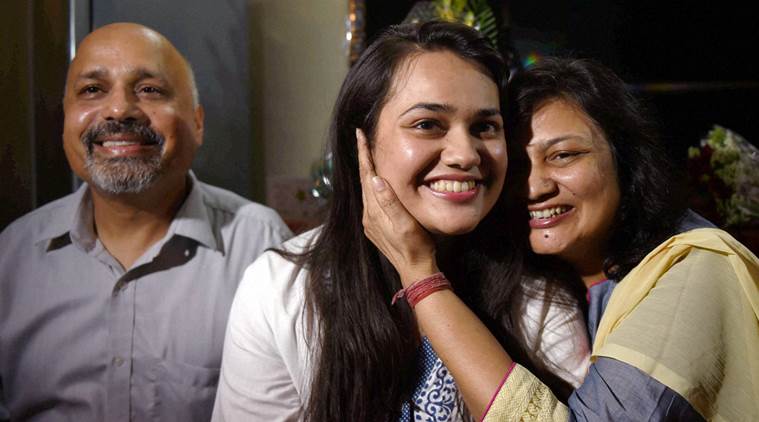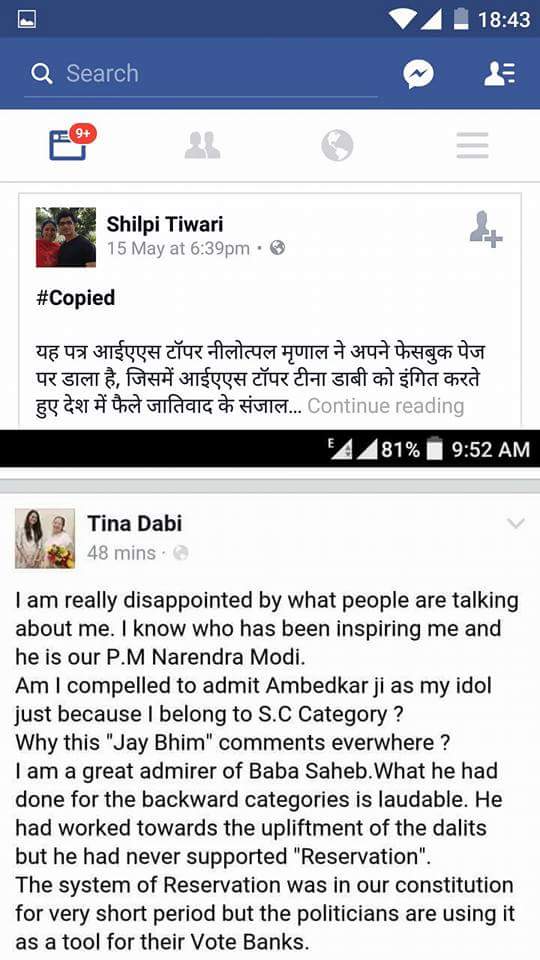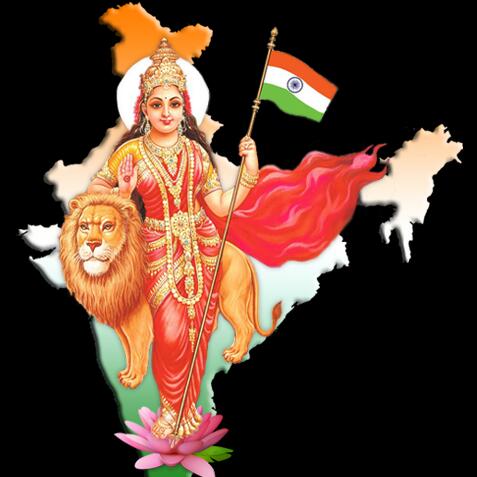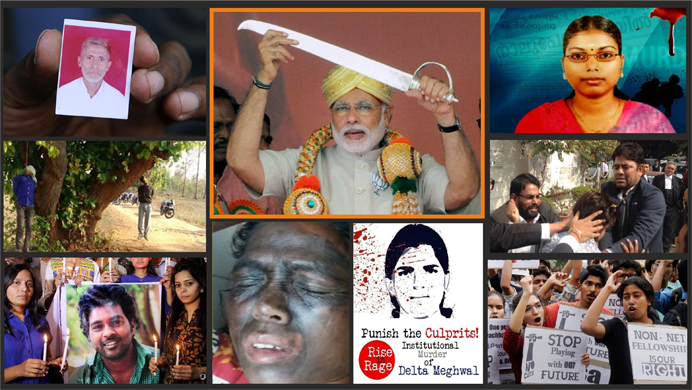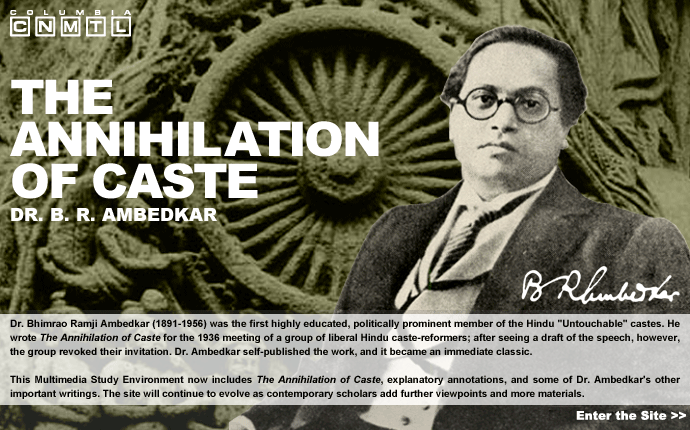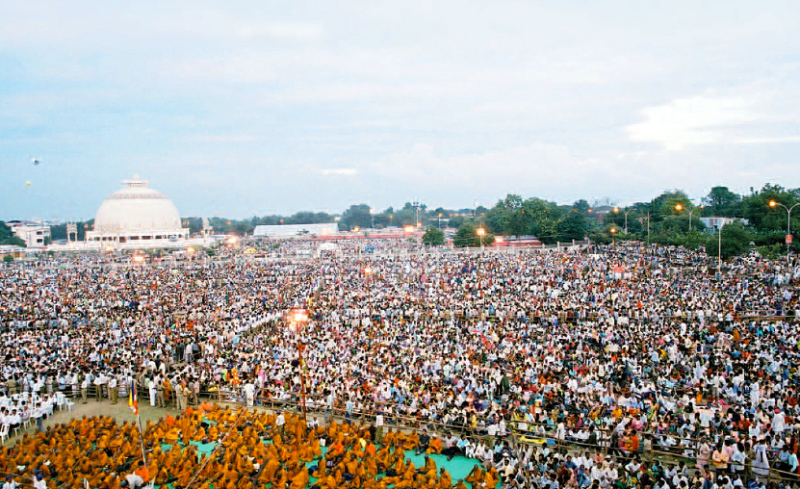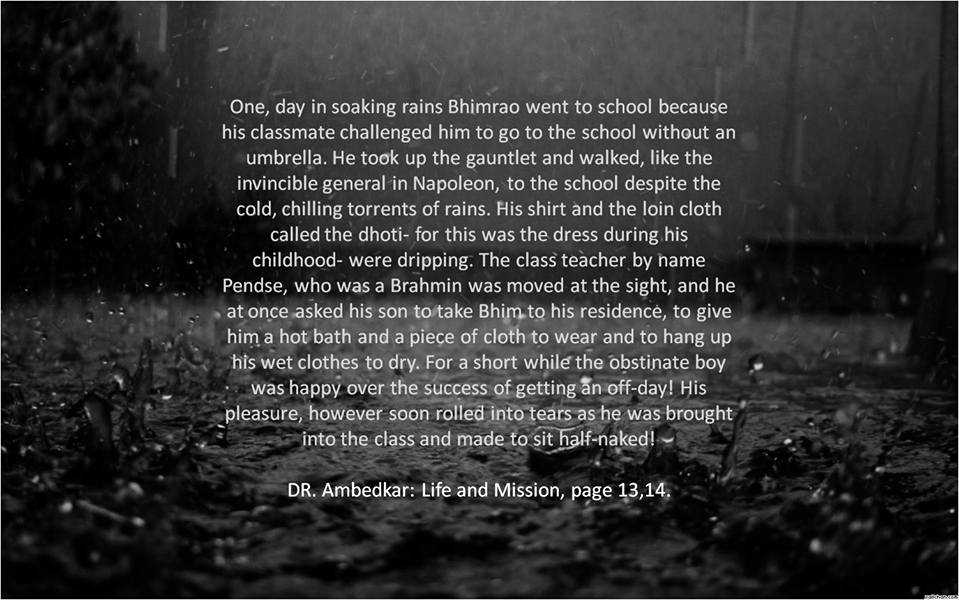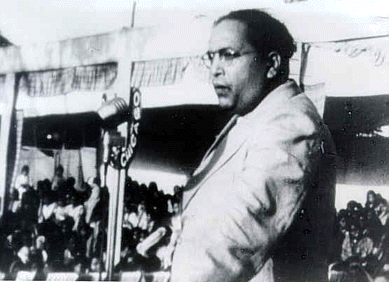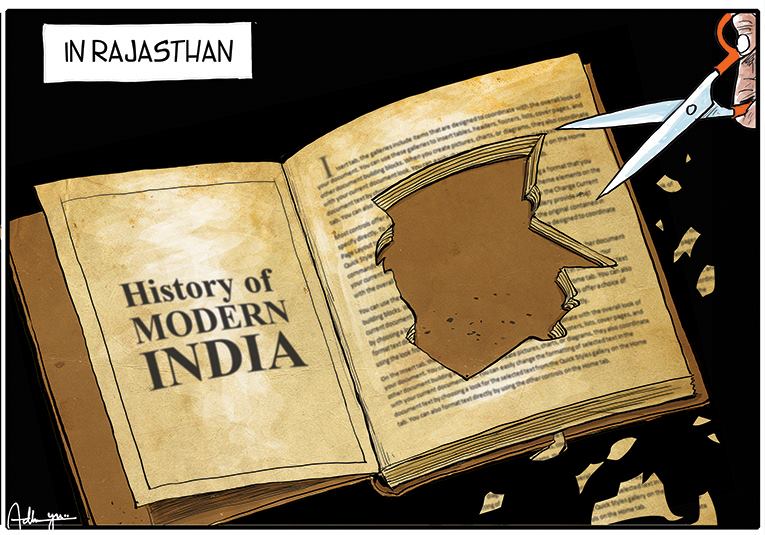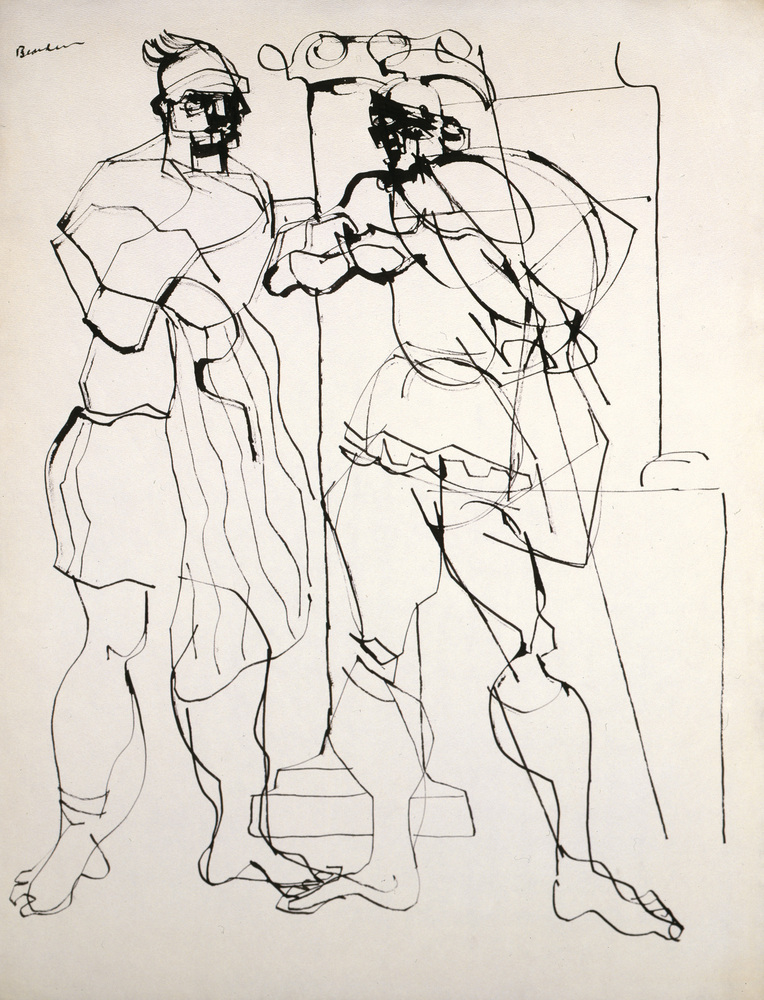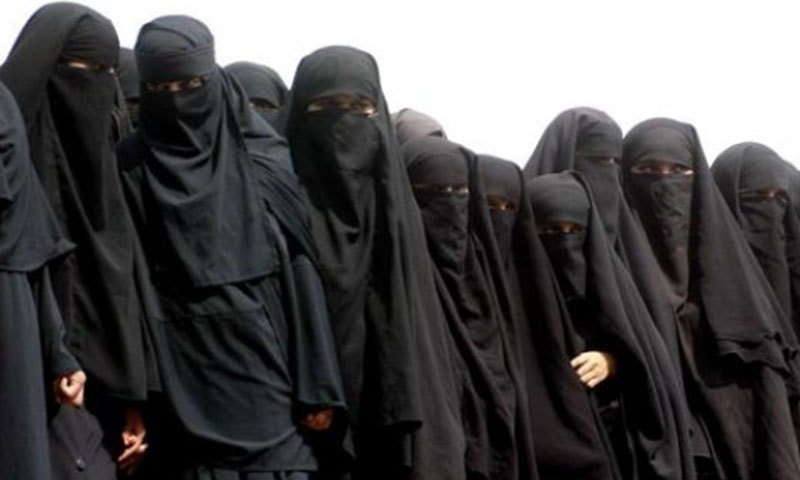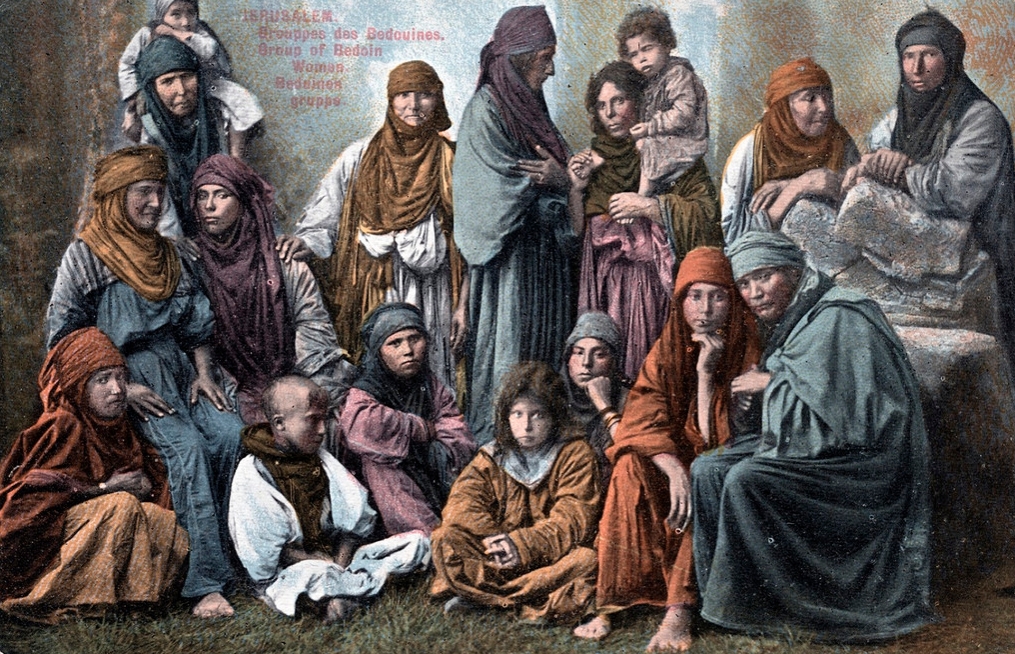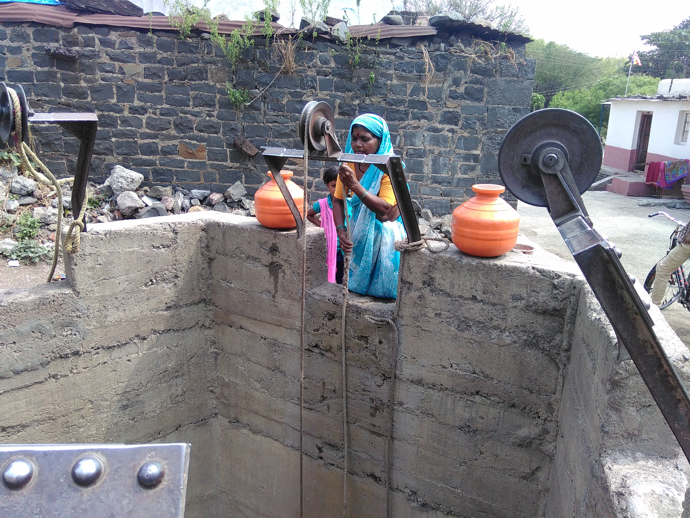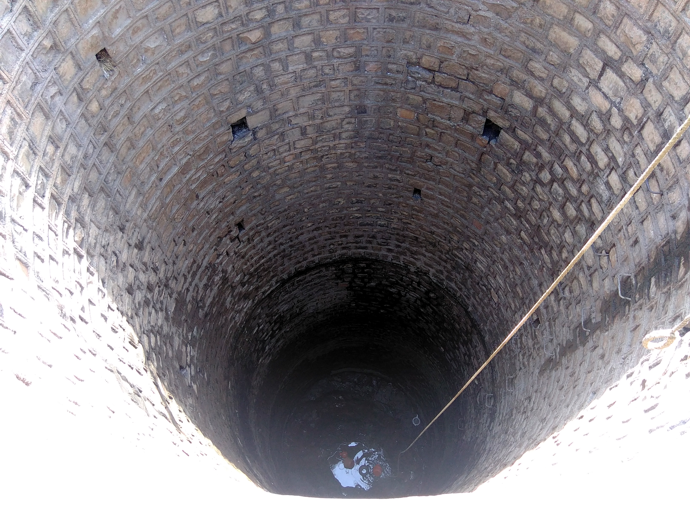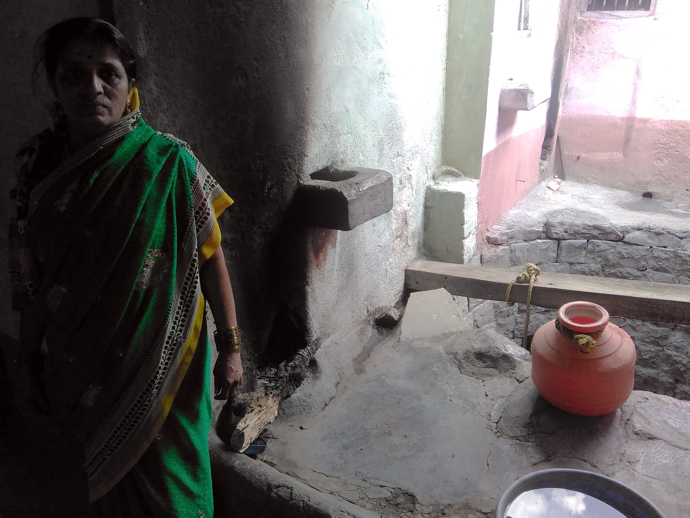
Image courtesy: Columbia University
These are no ordinary times to discuss Dalit vision* or rather reach a consensus around what could be called Dalit Vision. You have on one hand the upheaval witnessed in the country especially among educated young Dalits and broader democratic sections symbolised by the institutional murder of Rohith Vemula and the mass movement which it has generated. On the other hand you have renowned Dalit leaders paying obeisance before rabid reactionary forces. You have on one hand slogans of ‘Jai Bhim’ and ‘Lal Salaam’ being raised in unison on campuses across the country. On the other hand is the process of mythologising Dr Ambedkar and marginalising ‘his’ meaning.
Today as we embark on the task of understanding/analysing/debating Dalit Vision we have before us its multiple readings. A new radical reading of it is visible in the experiences of the Ambedkar-Periyar Study Circle at IIT Madras or Ambedkar Students Association at HCU. At the other end of the spectrum are people who venerate globalisation as the panacea of Dalits’ ills, or tell us that castes will vanish with the advance of capitalism. They proclaim to being the true legatee of this vision.
In fact a possibility does exist that the emancipatory thrust in Dr Ambedkar’s worldview is slowly being marginalised on the altar of pragmatic politics or around our immediate concerns of daily life. As an aside, it is important to remember that Dr Ambedkar did have apprehensions about it and had cautioned his followers to this effect.
In one of the most poignant moments of his life, at a public meeting held in Agra in February 1956 – where there was a large gathering of newly educated youth from oppressed communities – he became emotional (in fact the late Prof Tulsi Ram has written that he literally cried) when he realised that his followers were not bothered about society or other depressed sections.

Dr Ambedkar and a lakh of his followers convert to Buddhism. Photo credit: Lionsroar.com
2.
How does one proceed then to define/debate/discuss Dalit Vision in the present context, which is beyond rhetoric, decorative politicos and Brahminical hegemony?
One way is to 'collect' all these 'visions' or readings and find some commonality in them. Definitely an impossible task! What commonality could be derived from a 'vision' which in one manifestation supports status quoist politics and the other opposes it.
Perhaps the best option available is to not look at its present day exponents or its various manifestations available but go back to its best exponent ever and see how he envisioned things, how he analysed 'his' present or how he forecasted the 'future'. What sort of cautions did he share with his comrades to be taken note of? Taking him as our pole star, let us look at 'our' present, and define Dalit Vision for our times.
This revisiting would also serve another purpose.
We have been witness to a new brand of converts, supposedly to Ambedkar's worldview, who have started claiming him more aggressively these days surpassing even his loyal followers. Our search would also help demonstrate how the forefathers of these new converts derided him while he was alive and even after his death, and how he opposed their politics tooth and nail and cautioned his followers about it.
Today when the “new converts” are competing with each other to lay claim over his legacy let us not forget that one of their ideologues had even penned a monograph, 'Worshipping False Gods', running into several hundred pages in mid-nineties – spewing undiluted venom against Dr Ambedkar: (http://www.outlookindia.com/magazine/story/falsifying-the-truth/203929). It was an act for which the author was suitably rewarded by his ‘parivar’ when they held the reins of power at the Centre for the first time, an act for which one is yet to see any apology or self-criticism from them.

Image credit: Bolana.in
3.
Everybody would agree that it is a challenging task to encapsulate a great wo/man's vision in a few words. Of a person who as a public figure impacted not only her/his generation but future generations, initiated or channelised debates in society, led struggles, mobilised people, wrote thousands of pages and left a legacy for all of us to carry forward.
For a presentation within the given time constraint, it is next to impossible to look at Ambedkar's complete journey or rather quest to usher what Prof Gopal Guru calls 'an enlightened, inclusive India' from a 'bahishkrut' India.
Given the time constraint, one may focus more on the last decade of his life – the most tumultuous period in his as well as the newly independent nation's life – to know the important concerns which troubled his mind and how he envisioned the future trajectory of the movement he led and how he tried to chart a roadmap for the nascent nation given the support/cooperation and at times resistance from leading stalwarts of his time.
Such a focus would obviously rob us of an opportunity to look at the historic Mahad Satyagraha – which we in Marathi call as 'Mahad Kranti' (1927) an important milestone in his political life. Nor will we be able to look at the historic rally he organised against Khot Pratha– a feudal practice – along with communists, or his growing disillusionment with Hinduism, witnessed after the unsuccessful satyagraha for temple entry at 'Kalaram Mandir, Nashik' which continued for five years. Or the way he formed the Independent Labour Party, or how he told his followers (in his speech to Dalit Rail Workers) that they have to fight the twin enemies of 'capitalism' and 'Brahminism' etc and many other milestones of his life.
4.
First of all, what was his vision for independent India? Or how did he envision a future roadmap for India? Yes, he has been rightly called the chief architect of the Constitution and it was his intervention/presence – definitely with due support from Nehru and others – that he could include important pro-people or pro-marginalised provisions into it. But we cannot be under any illusion that it was only 'his vision' which triumphed ultimately.
The making of the Constitution itself was marked by pressures and counter-pressures from believers of radical change at one end and from the status quoists at the other. What emerged in the end can at best be called a compromise document between various contending forces, ideas.
Dr Ambedkar's distinction between the birth of political democracy in India – a one-man-one-vote regime – and the long road he saw ahead for its maturation into social democracy –a one-man-one-value regime – while dedicating the Constitution to the nation was in fact a reminder of the fact that the struggle is still far from over.
At another place he similarly underlined the limitations of such a constitutional exercise in a backward society like ours:
“Indians today are governed by two ideologies. Their political ideal set in the preamble of the Constitution affirms a life of liberty, equality and fraternity whereas their social ideal embedded in their religion denies it to them”.
(As an aside let me mention here that I continue to have my reservations about Dr Ambedkar's participation in the making of the Constitution. What would have been the course of history had he decided to remain outside and fought for inclusion of pro-people provisions? While one can marvel at the strategic move by Gandhi who insisted on his inclusion – despite his lifelong struggle against Congress – why did Dr Ambedkar feel compelled to take up the work? But this, of course needs to be sorted out another time).If we are keen to know Ambedkar’s 'vision' about a future India it can be discerned in his less discussed monograph: 'States and Minorities: What are Their Rights and How to Secure them in the Constitution of Free India'. The monograph was basically a '[m]emorandum on the Safeguards for the Scheduled Castes for being submitted to the Constituent Assembly on behalf of the Scheduled Castes Federation' he led. (http://www.ambedkar.org/ambcd/10A.%20Statesand%20Minorities%20Preface.htm)
The said monograph by the political organisation he led then does not limit itself to 'safeguards' but also warns of the danger of majoritarianism, incompatibility of Hinduism with any change, and suggests a model of economic development which he himself describes as “state socialism”.
 Image credit: Drambedkarbooks.org
Image credit: Drambedkarbooks.org5.
It would be quite enlightening for many of us how in the same monograph he envisaged that “State shall not recognise any religion as State religion” and “guarantee to every citizen liberty of conscience”. Coming to the aspect of protection against economic exploitation, he declared that “key industries shall be owned and run by the State” and even basic industries “shall be owned by the State and run by the State”. He was of the opinion that “agriculture shall be State industry.” The State shall divide the land acquired into farms of standard size, and these shall be cultivated as a collective farm, in accordance with rules and directions by the government and “tenants shall share among themselves in the manner prescribed the produce of the farm left after the payment of charges properly leviable on the farm”.
He further explains this clause in the following words:
“The main purpose behind the clause is to put an obligation on the State to plan the economic life of the people on lines which would lead to highest point of productivity without closing every avenue to private enterprise, and also provide for the equitable distribution of wealth. The plan set out in the clause proposes State ownership in agriculture with a collectivised method of cultivation and a modified form of State Socialism in the field of industry.”…”State Socialism is essential for the rapid industrialisation of India. Private enterprise cannot do it and if it did it would produce those inequalities of wealth which private capitalism has produced in Europe and which should be a warning to Indians. Consolidation of Holdings and Tenancy legislation are worse than useless.”
Interestingly, he does not propose that the idea of State Socialism be left to legislatures. He argued instead that it should be a “law of the Constitution”:
“The plan has two special features. One is that it proposes State Socialism in important fields of economic life. The second special feature of the plan is that it does not leave the establishment of State Socialism to the will of the Legislature. It establishes State Socialism by the Law of the Constitution and thus makes it unalterable by any act of the Legislature and the Executive.”
6.
In the same monograph he clearly differentiates between 'Untouchables' and 'Hindus'.
Gone were the days when he felt that Hinduism would reform itself from within. He had already declared more than a decade earlier at the Yeola conference in 1935: “I was born a Hindu, I had no choice. But I will not die a Hindu because I do have a choice.”
Ambedkar is unequivocal that the “Hindu population which is hostile to them (untouchables)” and emphasises that it is “not ashamed of committing any inequity or atrocity against them”. He is also not hopeful about their situation under Swaraj:
What can Swaraj mean to the Untouchables? It can only mean one thing, namely, that while today it is only the administration that is in the hands of the Hindus, under Swaraj the legislature and executive will also be in the hands of the Hindus, it goes without saying that such a Swaraj would aggravate the sufferings of the Untouchables. For, in addition to a hostile administration, there will be an indifferent legislature and a callous executive. The result will be that the administration unbridled in venom and in harshness, uncontrolled by the legislature and the executive, may pursue its policy of inequity towards the Untouchables without any curb. To put it differently, under Swaraj the Untouchables will have no way of escape from the destiny of degradation which Hindus and Hinduism have fixed for them…
He was very much aware about the dangers of majoritarianism implicit in the way Indian nationalism has developed which according to him:
[h]as developed a new doctrine which may be called the Divine Right of the majority to rule the minorities according to the wishes of the majority. Any claim for the sharing of power by the minority is called communalism while the monopolising of the whole power by the majority is called Nationalism.
And to protect the rights of the minorities (remember he does not restrict himself to religious minorities here but also includes the 'scheduled castes' in his definition) he proposes a form of executive which could serve following purposes
(i) To prevent the majority from forming a government without giving any opportunity to the minorities to have a say in the matter.
(ii) To prevent the majority from having exclusive control over administration and thereby make the tyranny of the minority by the majority possible.
(iii) To prevent the inclusion by the majority party in the executive representatives of the minorities who have no confidence of the minorities.
(iv) To provide a stable executive necessary for good and efficient administration.
In fact, his fears vis-a-vis the majoritarian impulses were evident in the political manifesto of the Scheduled Castes Federation itself — the political outfit which was set up by him in 1942 which rejected the RSS and Hindu Mahasabha as “reactionary” organizations.
And anyone who has looked at the making of Indian constitution would tell us why Dr Ambedkar considered them 'reactionary' parties. History is witness to the fact that they opposed its making and suggested in their organs that instead of a new constitution, the newly independent nation should adopt Manusmriti. A laughable suggestion right now but was seriously raised by its proponents.
“The worst [thing] about the new Constitution of Bharat is that there is nothing Bharatiya about it… [T]here is no trace of ancient Bharatiya constitutional laws, institutions, nomenclature and phraseology in it”…“no mention of the unique constitutional developments in ancient Bharat. Manu’s laws were written long before Lycurgus of Sparta or Solon of Persia. To this day his laws as enunciated in the Manusmriti excite the admiration of the world and elicit spontaneous obedience and conformity [among Hindus in India]. But to our constitutional pundits that means nothing”.— Editorial in Organiser, November 30, 1949, on the final draft of the Constitution which had just been presented to the Constituent Assembly by Ambedkar.
In his monograph, 'Pakistan or Partition of India', he reiterates his fears about the possible majoritarian turn at the hands of those who vouched for 'Hindu Raj':
“If Hindu Raj does become a fact, it will no doubt be the greatest calamity for this country. No matter what the Hindus say, Hinduism is a menace to liberty, equality and fraternity. On that account it is incompatible with democracy. Hindu Raj must be prevented at any cost.”
– Ambedkar, Pakistan or Partition of India, p. 358
Dr Ambedkar speaking at Yeola; Photo Credit: Lockermedia.com

7.
Much on the lines of lack of debate/discussion around 'States and Minorities', another important intervention during that period led by him has also received little attention. It was related to the struggle for the Hindu Code Bill, the first attempt in independent India to reform Hindu personal laws to give greater rights to Hindu women. The attempt was to put a stamp on monogamy and also ensure separation rights to women and also grant them rights in property. We know very well that it was a key reason that Ambedkar resigned from the Cabinet led by Nehru because he felt that despite lot of attempts not much headway could be made in granting these rights. In his resignation letter he underlined the importance he attached to the bill:
“To leave inequality between class and class, between sex and sex, which is the soul of Hindu society untouched and to go on passing legislation relating to economic problems is to make a farce of our Constitution and to build a palace on a dung heap. This is the significance I attached to the Hindu Code.” – (See more at:
http://www.hardnewsmedia.com/2016/04/appropriating-ambedkar#sthash.b53dwFL4.dpuf)
How the Hindutva Right and the conservative sections within the Congress coupled with the saffron robed swamis and sadhus had joined hands to oppose the enactment of Hindu Code Bill is a fact of history. In fact, this motley combination of reactionary, status quoist forces did not limit itself to issuing statements. It opposed the bill on the streets and led large scale mobilisation at pan-India level against the bill. There were occasions when they even tried to storm Dr Ambedkar's residence in Delhi.
The main argument peddled against Ambedkar was that the bill was an attack on “Hindu religion and culture”. One can get an idea of the resistance to the bill listening to the intervention by Acharya Kriplani on the floor of the house. While supporting the bill he said:
"I am afraid I do not see the point in Hindu religion being in danger. Hindu religion is not in danger when Hindus are thieves, rogues, black marketeers and bribe-takers. Hindu religion is not endangered by people who want to reform a particular law. May be, they are over-zealous, but it is better to be over-zealous in things idealistic than be corrupt in material things. "
— Acharya Kriplani on the floor of the house while discussing Hindu Code Bill, (24 Dec 1949, Economic Weekly)
An excerpt from Ramchandra Guha's book gives us further indication concerning the resistance to the bill:
“The anti-Hindu code bill committee held hundreds of meetings throughout India, where sundry swamis denounced the proposed legislation. The participants in this movement presented themselves as religious warriors (dharmaveer) fighting a religious war (dharmayudh). The Rashtriya Swayamsevak Sangh threw its weight behind the agitation. On the 11th of December, 1949, the RSS organised a public meeting at the Ramlila grounds in Delhi, where speaker after speaker condemned the bill. One called it ‘an atom bomb on Hindu society’… The next day a group of RSS workers marched on the assembly buildings, shouting ‘Down with Hindu code bill’… The protesters burnt effigies of the prime minister and Dr Ambedkar, and then vandalised the car of Sheikh Abdullah.” ('India after Gandhi', Guha; See more at: http://indianexpress.com/article/opinion/columns/bhagwats-ambedkar/#sthash.6ZNPVwHq.dpuf)
Shyama Prasad Mukherjee, founder of BJP’s predecessor, the Bharatiya Jan Sangh, had said the Bill would “shatter the magnificent structure of Hindu culture.”
In fact, like Mahatma Phule – whom Ambedkar called the 'Greatest Shudra' and included him in the triumvirate of Buddha, Kabir whom he considered to be his teachers – the concern for women's emancipation was always an integral part of any movement led by Ambedkar.
8.
I will accept and follow the teachings of Buddha. I will keep my people away from the different opinions of Hinyan and Mahayan, two religious orders. Our Bouddha Dhamma is a new Bouddha Dhamma, Navayan.
Dr. Babasaheb Ambedkar, press interview on 13 October 1956, at Sham Hotel, Nagpur.
An important development in the last decade of his life was his decision to embrace Buddhism with lakhs of followers. Apart from his deep fascination for Buddhism from younger days, his conversion to Buddhism had also to do with his contention that the 'untouchables' were in fact former Buddhists. He elaborates it in his book
'The Untouchables: A Thesis on the Origin of Untouchability’ (1948). (For details:
https://kafila.org/2016/04/26/jayadeva-uyangoda-on-ambedkars-legacy/).
Thus it could be said for Ambedkar it was a return to his/their original religion rather than a conversion. Interestingly, one finds deep commonality between Dr Ambedkar and Jyothee Thass, the great Tamil-Buddhist scholar, who also maintained that 'Untouchables' were early Buddhists.
His 'conversion' to Buddhism was also renouncement of Hinduism which according to him had:
'[p]roved detrimental to progress and prosperity of my predecessors and which has regarded human beings as unequal and despicable' (See Pledge 19).
The 22 pledges he administered to his followers on the occasion can broadly be categorise them into four – complete rejection of Hindu gods (e.g., “I will not accept Brahma, Vishnu and Mahesh as god and will not worship them”); their worship and the related rituals (“I will not perform
Shraddha Paksh or
Pind Dana (rituals to respect the dead); acceptance of the principles and teachings of Buddhism; declaration that “all human beings are equal” and “no faith in divine incarnation”.
An important aspect of this 'return' or 'conversion' is the fact that it was also a reinterpretation of Buddhism which he described as Navayan – a new vehicle. Apart from a long monograph, 'Buddha and His Dhamma', where he tries to revisit Buddha one, can get a glimpse of his reading of Buddha and his teachings from the speech he delivered in Kathmandu, merely a fortnight before his death which was posthumously published as, 'Buddha Or Karl Marx’. (http://www.ambedkar.org/ambcd/20.Buddha%20or%20Karl%20Marx.htm)
Summarising 'The Creed of Buddhism' while underlining necessity of 'religion for a free society' he says many things which would be rather unacceptable to a scholar or follower of religion where he seems to reject the 'necessity of God' as well as shastras and rituals. Some examples: “Religion must relate to facts of life and not to theories and speculations about God, or soul or heaven or earth”; “It is wrong to make God the centre of Religion”; “It is wrong to make salvation of the soul as the centre of Religion”; “It is wrong to make animal sacrifices to be the centre of religion”; “Real religion lives in the heart of man and not in the shastras”; “Man and morality must be the centre of religion. If not, religion is a cruel superstition”; “It is not enough for morality to be the ideal of life. Since there is no God it must become the law of life.”
Ambedkar distances himself from popular definitions of religion first by criticising the way religion(s) have tried to explain the origin and end of world around and says that its “function is to reconstruct the world and to make it happy”. He explores the source of unhappiness and does not talk about “sins” or “otherworldly affairs” but says that “unhappiness in the world is due to conflict of interest and the only way to solve it is to follow the Ashtanga Marga”.
Further elaborating on 'Creed of Buddhism' he says that “private ownership of property brings power to one class and sorrow to another” and that “it is necessary for the good of society that this sorrow be removed by removing its cause”. While religions the world over have remained the basis of 'othering' – which in extreme cases have even resulted in large-scale genocides – in Buddhism as perceived by Ambedkar, “All human beings are equal”; “Worth and not birth is the measure of man”.
While supporting the “War for truth and justice” and also emphasising that the “Victor has duties towards the Vanquished” in the last portion of his summary of ‘Creed of Buddhism', he not only challenges monopoly of the few over learning (Everyone has a right to learn; Learning is as necessary for man to live as food is), he also states that “Everything is subject to the law of causation” and: “Nothing is final. Nothing is infallible. Nothing is binding forever. Everything is subject to inquiry and examination. Nothing is permanent or sanatan. Everything is subject to change. Being is always becoming.”
9.
This speech – as the title shows – also throws light on his views about Marxism. Of course it is not for the first time that he had expressed his views on the theme. In his famous booklet,
'Annihilation of Caste', he had already made it clear that while he appreciates the goal of Marxism but is repelled by its Indian practitioners.
In this speech also he declares that “Buddha is not away from Marx” if “for misery one reads exploitation”.
For him non-violence is not an issue of principle. “The Buddha was against violence. But he was also in favour of justice and where justice required he permitted the use of force”. Ambedkar further writes that:
Violence cannot be altogether dispensed with. Even in non-communist countries a murderer is hanged. Does not hanging amount to violence? Non-communist countries go to war with non-communist countries. Millions of people are killed. Is this not violence? If a murderer can be killed, because he has killed a citizen, if a soldier can be killed in war because he belongs to a hostile nation, why cannot a property owner be killed if his ownership leads to misery for the rest of humanity? There is no reason to make an exception in favour of the property owner, why one should regard private property as sacrosanct?
He also underlines that even “Buddha established communism so far as the Sangh was concerned”:
The Russians are proud of their communism. But they forget that the wonder of all wonders is that the Buddha established communism so far as the Sangh was concerned without dictatorship. It may be that it was a communism on a very small scale but it was communism without dictatorship, a miracle which Lenin failed to do.
Of course he underlines that:
The Buddha's method was different. His method was to change the mind of man: to alter his disposition: so that whatever man does, he does it voluntarily without the use of force or compulsion.
Perhaps in the last para of his speech he makes concluding remarks in this debate and seems to validate what friend Anand Teltumbde calls, “His decision as confirming to Marxism, minus violence and dictatorship in the latter”: (
http://www.countercurrents.org/teltumbde160812.htm)
…It has been claimed that the communist dictatorship in Russia has wonderful achievements to its credit. There can be no denial of it. That is why I say that a Russian dictatorship would be good for all backward countries. But this is no argument for permanent dictatorship. …
We welcome the Russian Revolution because it aims to produce equality. But it cannot be too much emphasised that in producing equality society cannot afford to sacrifice fraternity or liberty. Equality will be of no value without fraternity or liberty. It seems that the three can coexist only if one follows the way of the Buddha. Communism can give one but not all.
10.
As I said in the beginning these are no ordinary times to discuss Dalit vision. We have before us an India where, to quote Achin Vanaik:
..[t]he centre of gravity has shifted perhaps decisively to the right, in three crucial spheres: economy, secularism and democracy.
It is an India where the political dispensation at the centre is busy furthering the exclusivist/majoritarian worldview of Hindutva supremacism coupled with the neo-liberal economic agenda under the glib talk of development and concerted attack has been unleashed on what Ambedkar defined as minorities of various kinds and other deprived sections.
What can be said to be the contours of Dalit Vision for our times then?
It will have to be necessarily for ensuring that: “State shall not recognise any religion as state religion”; “guarantee to every citizen liberty of conscience”; against “majoritarianism of every kind”; and specifically, prevent majority from forming a government without giving any opportunity to the minorities to have a say in the matter; for women's emancipation; for State ownership in agriculture with a collectivised method of cultivation and a modified form of State Socialism in the field of industry; against inequalities of wealth which private capitalism produces; necessarily for annihilation of caste as “the existence of the caste system is a standing denial of the existence of ideals of society and therefore of democracy” (speech on the ‘Voice of America’ radio, May 20, 1956); for reason, rationality and scientific temper; and against dumbing down of minds.
It does not need reminding that it will not be based on sanitisation or vulgarisation of Dr Ambedkar in any form as it is being experimented these days. While his appropriation by the Hindutva Right has been widely commented upon and exposed as their attempts to carve out a 'suitable' Ambedkar for their project based on exclusion and hatred, much needs to be done to expose his projection as a free market economist. (
http://www.countercurrents.org/teltumbde110911.htm)
Scholarly sounding pieces have appeared based on selective quotes from his vast corpus of writings to project him as a 'Free Market Economist” [
http://blog.mises.org/16519/ambedkar-the-forgotten-free-market-economist/]. Capitalism is being valorised supposedly for annihilation of caste (Chandrabhan Prasad and Milind Kamble, Manifesto to End Caste: Push Capitalism and Industrialisation to Eradicate this Pernicious System,
Times of India, January 23, 2013).
It is being argued by noted columnists and upcoming industrialists from the oppressed communities:
Capital is the surest means to fight caste. In dalit's hands, capital becomes an anti-caste weapon; little wonder that the traditional caste code prohibits dalits from accumulating wealth. Dalit capitalism is the answer to that regime of discrimination. The manifesto demands promotion of dalit capitalism through a variety of means – procurement, credit options and partnerships.
An important point to note is that Dalit Vision will have to be wary of 'hero worship' or placing 'liberties at the feet of a great man' as it can culminate in “subverting of institutions” in a democracy as
Ambedkar has warned us. In fact he had this to say while dedicating the Constitution to the nation:
“This caution is far more necessary in the case of India than in the case of any other country. For in India, Bhakti or what may be called the path of devotion or hero-worship, plays a part in its politics unequalled in magnitude by the part it plays in the politics of any other country in the world. Bhakti in religion may be a road to the salvation of the soul. But in politics, Bhakti or hero-worship is a sure road to degradation and to eventual dictatorship.”
Everybody can see that this caution has contemporary import. It was only last month that a responsible minister of the ruling dispensation told us that the honourable PM was "God's gift to India”.
While bhakts may rejoice about this unique gift to India, every sensible person would agree that if this trend is allowed to continue then it is a “sure road to degradation and eventual dictatorship”.
(*Draft of presentation made at a discussion on ‘Dalit Vision: Beyond Rhetoric, Decorative politicos, Brahminical hegemony and Maharashtra’; May 1, 2016, in Delhi, organised by India International Centre, Maharashtra Sanskritik ani Rannaniti Adhyayn Samiti and Working Group on Alternative Strategies).
(Subhash Gatade is the author of Pahad Se Uncha Aadmi (2010), Godse's Children: Hindutva Terror in India (2011) and The Saffron Condition: The Politics of Repression and Exclusion in Neoliberal India (2011). He is also the Convener of New Socialist Initiative (NSI) Email: subhash.gatade@gmail.com
